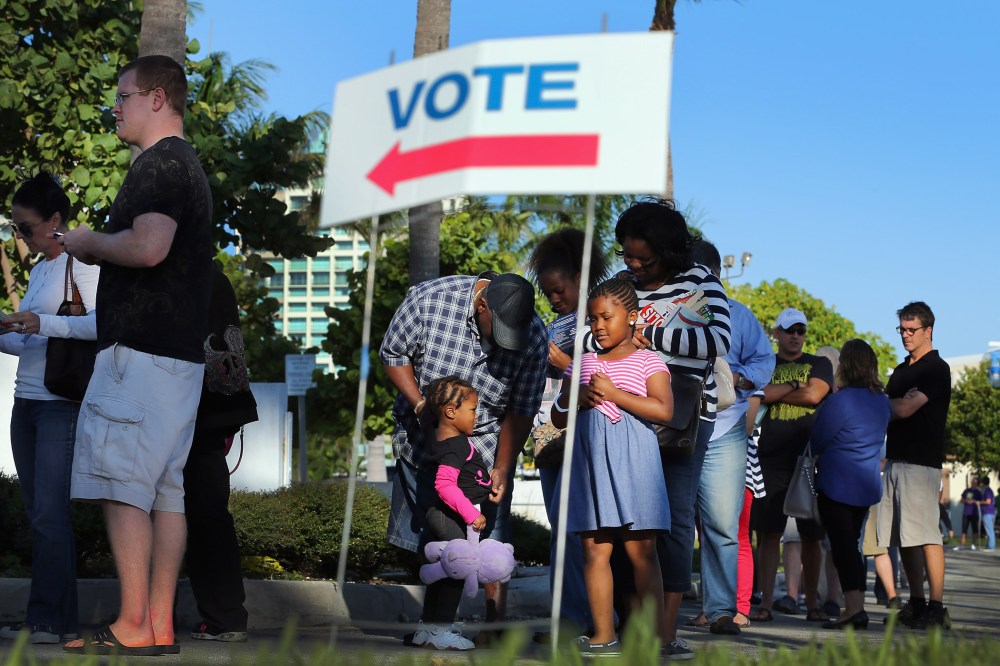Civil rights advocates pressed lawmakers Wednesday at a contentious Senate hearing to advance a bill that would strengthen the Voting Rights Act, saying a failure to do so would represent a historic betrayal of African-American aspirations for political equality. But Republicans appeared unmoved.
“If the Voting Rights Act is not modernized, then you are effectively ending the second Reconstruction of the United States,” Rev. Francys Johnson, the president of the Georgia NAACP, told members of the Senate Judiciary Committee. The hearing took place a year to the day after the Supreme Court weakened the landmark law in Shelby County v. Holder.
At issue was the Voting Rights Amendment Act (VRAA), bipartisan legislation introduced in January that would reactivate Section 5, a key provision of the Voting Rights Act that was struck down by the court in Shelby. Section 5 had required certain states and areas with a history of race bias in voting to submit any election changes to the federal government for approval—known as “preclearance”— before they went into effect. The court ruled that the formula to determine which states were covered was out of date, and said Congress would need to write a new one if it wanted to revive Section 5.
In an interview with msnbc, Barbara Arnwine, the president of the Lawyers Committee for Civil Rights Under Law, called the Voting Rights Act “one of the most important laws anywhere in the country—anywhere in the world—because it stopped discrimination before it occurred.”
Lately, voting rights advocates have been urging the Republican-controlled House of Representatives to hold a hearing on the VRAA. That hasn’t happened — Rep. Bob Goodlatte, a Virginia Republican and the House Judiciary Committee chair, is said to believe that current law does enough to protect against discrimination in voting. And no Republican senators have signed on to co-sponsor the legislation. But Wednesday’s Senate hearing, chaired by Sen. Pat Leahy, a Vermont Democrat, nonetheless offered a chance to draw attention to the issue.
Much of the hearing centered on that very question: Does the existing Voting Rights Act do enough to stop racial discrimination in voting? The Republican senators and the conservatives witnesses, led by Michael Carvin, a Republican election lawyer, acknowledged that race bias in voting still exists. But they argued Section 2, which applies nationwide and allows victims of discrimination to sue after the fact, is all that’s needed to stop it.
Carvin called Section 2 “more than adequate to address any unconstitutional discrimination.”
But Sherrilyn Ifill, a lawyer for the NAACP Legal Defense and Education Fund, said Section 2, while important, isn’t enough. That’s because litigation can be costly and time-consuming, meaning potentially discriminatory election changes sometimes remain in place while an election takes place.
“We reject the notion that the right to vote should be premised on a voter’s ability to find a lawyer and file a lawsuit,” Ifill said.
That’s especially true, Ifill said, when it comes to local-level changes, which, without the preclearance requirement, can’t be effectively tracked by the federal government or national voting rights advocates. She cited recent election changes in places like Morgan County, Georgia and Galveston County, Texas, which have reduced minority political power and went into effect before opposition could be rallied.
“This is where the greatest mischief has occurred, and where preclearance makes all the difference,” Ifill said.
Though Carvin touted the effectiveness of Section 2, he didn’t mention that many conservatives want to narrow its scope. Right now, it applies not just to intentional discrimination, but to actions that have a discriminatory result. Lately, top conservative legal scholars have been arguing that that’s too broad, and that the Voting Rights Act should bar only intentional discrimination. But if that were the case, it would be almost useless, since proving intentional discrimination is extremely difficult in an age when few people publicize their own bigotry.











